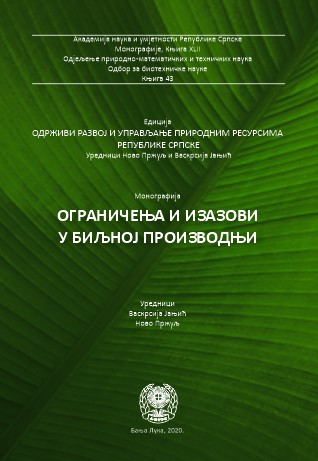Plants – an invaluable wealth of the Republic of Srpska
DOI:
https://doi.org/10.7251/EORU2003001JKeywords:
Plants, natural wealth, organic matter, photosynthesisAbstract
This chapter discusses the global importance of plants not only in the Republic of Srpska but also in the surrounding countries and in the world as a whole. The importance of plants is considered through their role in the formation of organic matter using solar energy. The role of man in the process of education of organic matter is considered, and then an overview of the biodiversity of the plant world in different regions of the Earth as well as the floristic richness in certain countries of the world is given. The importance of using plants in the creation of new varieties and hybrids is especially considered, and the importance of wild relatives for selection, hybridization and theoretical scientific research is especially pointed out. In the Republic of Srpska, not enough, systematic and planned work has been done on the study of floridiversity and the creation of new varieties and hybrids, which represents great damage, but also the obligation to start comprehensive work on this, for the country, very important program in the near future. Selection and creation of new varieties and hybrids is not a novelty of our time. For centuries, people have been selecting and sowing the best seeds. But the creation of new varieties and hybrids is impossible without wild relatives. Wild relatives represent an invaluable natural resource, a source of genes for specific adaptations, an inexhaustible gene pool for new crosses and selection, a biological resource from which a selectively depleted strain, variety or variety can be quickly realized by genetic engineering and other biotechnological methods. Wild species from our flora are of inestimable importance for selection, hybridization, plantation as well as theoretical scientific research. Various restrictions on crop production, such as the use of mineral fertilizers, the damage caused to plant production by plant diseases, pests and weeds, and the various problems arising from the use of pesticides, have been specifically addressed. Problems with the cultivation of genetically modified plants have been briefly addressed among the challenges in plant production. Small and underdeveloped countries, which include Republika Srpska to a significant extent, were spared from such negative consequences. Therefore, this century will be characterized by the need for effective protection of agroecosystems, plants and other living world.
